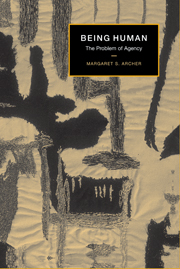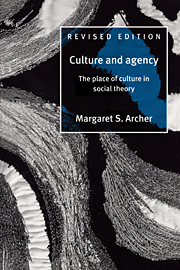Making our Way through the World
How do we reflect upon ourselves and our concerns in relation to society, and vice versa? Human reflexivity works through 'internal conversations' using language, but also emotions, sensations and images. Most people acknowledge this 'inner-dialogue' and can report upon it. However, little research has been conducted on 'internal conversations' and how they mediate between our ultimate concerns and the social contexts we confront. In this book, Margaret Archer argues that reflexivity is progressively replacing routine action in late modernity, shaping how ordinary people make their way through the world. Using interviewees' life and work histories, she shows how 'internal conversations' guide the occupations people seek, keep or quit; their stances towards structural constraints and enablements; and their resulting patterns of social mobility.
- Deals with popular but unexamined assumptions made by leading theorists, such as Bourdieu and Beck
- Discusses how reflexivity changes from high modernity to nascent globalisation
- Theoretical points are made through accessible narratives
Product details
June 2007Hardback
9780521874236
352 pages
229 × 160 × 21 mm
0.69kg
Available
Table of Contents
- Introduction. Reflexivity: the unacknowledged condition of social life
- Part I:
- 1. Reflexivity's biographies
- 2. Reflexivity in action
- 3. Reflexivity and working at social positioning
- Part II: Introduction: how 'contexts' and 'concerns' shape internal conversations
- 4. Communicative reflexives: working at staying-put
- 5. Autonomous reflexives: upward and outward bound
- 6. Meta-reflexives: moving on
- Part III:
- 7. Internal conversations and their outworks
- Conclusion. Reflexivity's future
- Methodological appendix.













